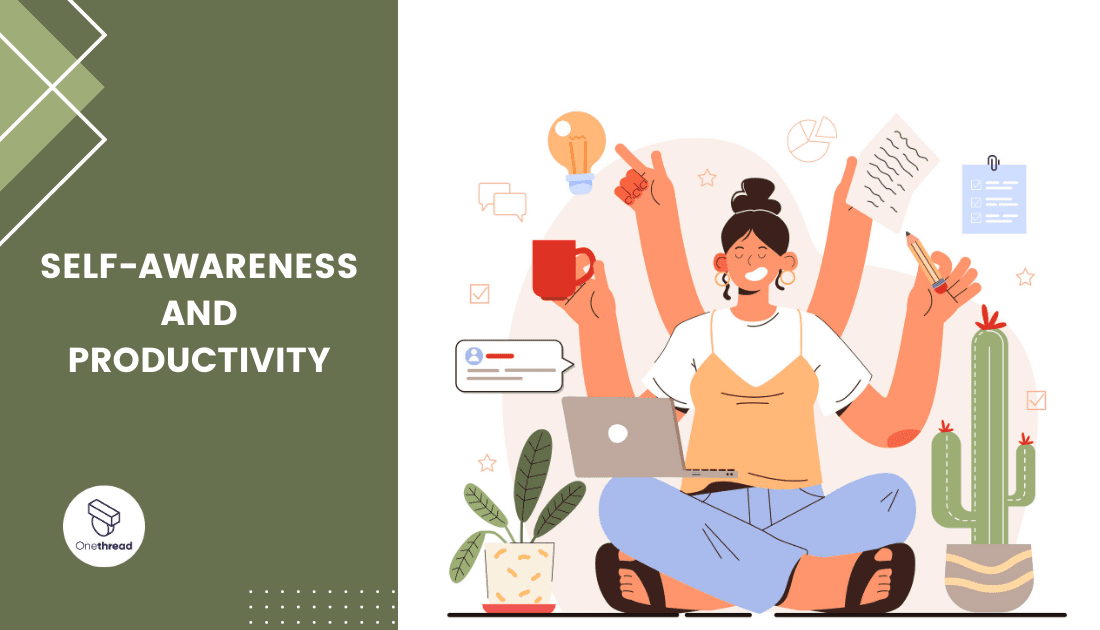Have you ever wondered how your self-awareness could be the secret ingredient to turbocharging your productivity? Or, how self-awareness and productivity could be linked to each other? Well, you’re in for a treat! In this article, we’re going to delve into the fascinating world of self-awareness and its profound impact on your productivity.
So, grab your favorite beverage, get cozy, and get ready to unlock the potential within yourself. Let’s embark on this journey of self-discovery and productivity mastery together!
What Does Self-Awareness Mean?
Self-awareness is the ability to consciously recognize and understand one’s own thoughts, emotions, beliefs, and actions. It involves having a clear perception of oneself, including strengths, weaknesses, values, and motivations. Essentially, self-awareness is the deep understanding of who we are, what drives us, and how we impact others and the world around us.

Being self-aware involves looking inward and examining our feelings, behaviors, and attitudes with honesty and openness. It goes beyond simply knowing factual information about oneself; it involves gaining insight into our patterns of behavior, emotional responses, and thought processes.
Self-awareness plays a fundamental role in personal growth and development. When we are self-aware, we can make better decisions, manage our emotions more effectively, and have healthier relationships with others.
It enables us to identify improvement areas, leverage our strengths, and work on personal and professional goals with clarity and purpose.
Overall, self-awareness is an ongoing process of self-exploration and reflection. It empowers us to live authentically, make meaningful choices, and continuously grow as individuals. Cultivating self-awareness is a powerful journey that allows us to embrace our true selves and lead more fulfilling and purposeful lives.
Types of Self-Awareness
Self-awareness can be categorized into two main types:
Internal Self-Awareness
Internal self-awareness involves understanding and recognizing one’s own emotions, thoughts, values, and beliefs. It is the ability to introspect and gain insight into the inner workings of one’s mind and emotions.
People with high internal self-awareness are more in tune with their feelings, motivations, and desires. They can identify their strengths, weaknesses, and areas for personal growth. Internal self-awareness is crucial for understanding how our emotions and thoughts influence our behavior and decision-making.
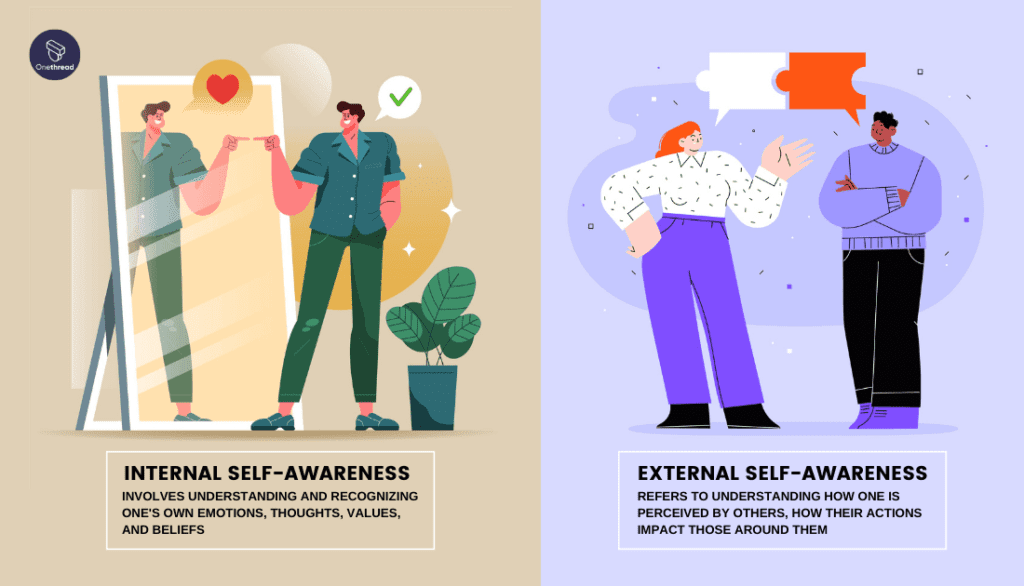



External Self-Awareness
External self-awareness refers to understanding how one is perceived by others, how their actions impact those around them, and how they fit into the social context. This aspect of self-awareness involves being receptive to feedback from others, both positive and constructive.
Individuals with high external self-awareness are attentive to how their behavior and communication affect their relationships and interactions with others. They can adjust their actions and communication styles based on social cues and the needs of those around them.
It’s important to note that internal and external self-awareness are interconnected. Understanding oneself internally can lead to better awareness of how one is perceived by others, and vice versa. These two types of self-awareness work in tandem to facilitate personal growth, interpersonal effectiveness, and overall well-being.
Additionally, there is a concept known as “meta-awareness,” which is a higher level of self-awareness. Meta-awareness involves being aware of one’s own awareness. In other words, it is the ability to step back and observe one’s thoughts and emotions without being completely immersed in them.
Meta-awareness enables individuals to gain perspective on their thought patterns and emotional reactions, allowing for greater emotional regulation and cognitive flexibility.
How Does Self-Awareness Increases Productivity?
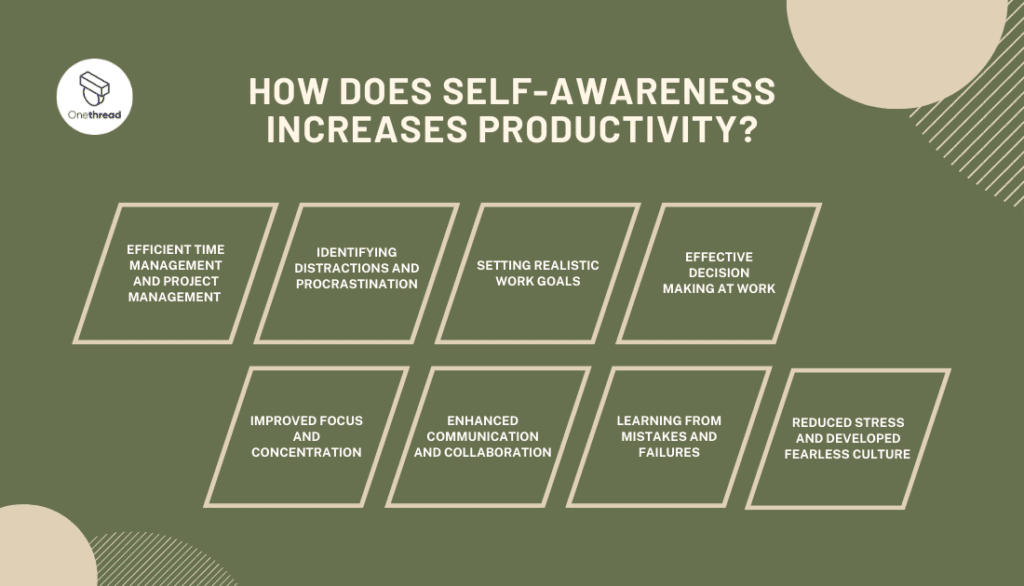



Self-awareness increases productivity in several compelling ways:
Efficient Time Management and Project Management
When you are self-aware, you have a clear understanding of your priorities, strengths, and weaknesses. This self-knowledge enables you to allocate your time and energy more effectively, focusing on tasks that align with your goals and capabilities.
As a result, you become more efficient in managing your projects and time and are less likely to waste valuable resources on activities that don’t contribute to your productivity. This is essential for both project management and time management.
Identifying Distractions and Procrastination
Self-aware individuals are better at recognizing distractions and tendencies to procrastinate. By understanding their thought patterns and emotional triggers, they can address these issues head-on and implement strategies to stay focused and on track. This heightened self-awareness helps them resist distractions and avoid falling into unproductive habits.
Setting Realistic Work Goals
Being self-aware allows you to set more realistic and achievable goals. You understand your strengths and limitations, enabling you to establish objectives that are challenging yet attainable.
This prevents setting overly ambitious goals that might lead to burnout or disappointment, and instead, encourages steady progress towards success.
Effective Decision Making At Work
Self-awareness helps you make informed decisions based on a deeper understanding of yourself and your values. This clarity enables you to align your choices with your long-term objectives and avoid impulsive or conflicting decisions that might hinder productivity.
Improved Focus and Concentration
By being aware of your emotional state and cognitive processes, you can better regulate your emotions and maintain focus during challenging tasks.
Self-awareness allows you to recognize when your concentration is waning and take proactive steps to re-engage with your work, ultimately leading to higher productivity levels.
Enhanced Communication and Collaboration
Self-aware individuals have a better understanding of their communication style and how it impacts others. This awareness fosters more effective communication and collaboration with team members, reducing misunderstandings and conflicts that can hinder progress.
Learning from Mistakes and Failures
Self-awareness helps you view mistakes and failures as opportunities for growth rather than setbacks. Instead of dwelling on errors, you can learn from them, adapt, and improve. This resilience and ability to learn from experiences contribute to increased productivity over time.
Reduced Stress and Developed Fearless Culture
Self-awareness allows you to recognize signs of stress and burnout early on. By acknowledging your limits and knowing when to take breaks, you can prevent exhaustion and maintain a healthy work-life balance, ultimately sustaining productivity in the long run.
In conclusion, self-awareness empowers individuals to understand themselves better, manage their time effectively, set realistic goals, and make informed decisions. By leveraging this understanding, self-aware employees and individuals can enhance their focus, ensure professional development, reduce distractions, and cultivate a more productive and fulfilling work environment.
What Are the 4 Key Concepts of Self-Awareness?
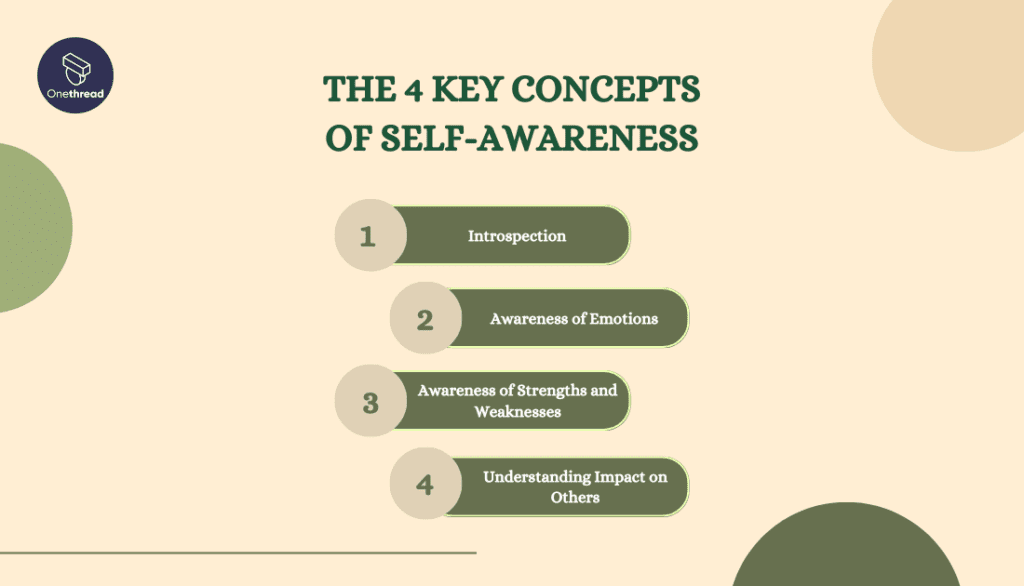



The four key concepts of self-awareness are:
Introspection
Introspection involves the process of looking inward and examining one’s thoughts, emotions, and behaviors. It is the ability to reflect on one’s own experiences, actions, and motivations with honesty and objectivity.
Introspection allows individuals to gain deeper insights into their inner world, identify patterns of behavior, and understand their emotional responses to different situations.
Awareness of Emotions
This concept focuses on recognizing and understanding one’s emotions. It involves being in tune with your feelings, acknowledging their presence, and understanding the reasons behind them.
Being aware of emotions helps individuals manage their emotional reactions more effectively, leading to better emotional regulation and decision-making.
Awareness of Strengths and Weaknesses
Understanding one’s strengths and weaknesses is essential for self-awareness. Recognizing your areas of expertise and the skills you excel in allows you to leverage them to your advantage.
Simultaneously, acknowledging your weaknesses helps you identify areas for improvement and personal growth. By understanding both your strengths and weaknesses, you can make more informed decisions and set realistic goals.
Understanding Impact on Others
Self-awareness extends beyond the individual and includes awareness of how one’s actions and communication impact others. This concept involves being sensitive to how your behavior affects those around you and being receptive to feedback from others.
Understanding your impact on others allows for better interpersonal relationships, effective collaboration, and enhanced social skills.
These four key concepts of self-awareness work together to create a holistic understanding of oneself. Introspection leads to greater emotional awareness, which, in turn, helps in recognizing strengths and weaknesses.
When you understand yourself and your impact on others, you can navigate social situations more skillfully and make choices that align with your values and goals. By embracing these concepts, individuals can develop a deeper level of self-awareness, fostering personal growth, and leading to a more fulfilling life.
How to Cultivate Self Awareness?
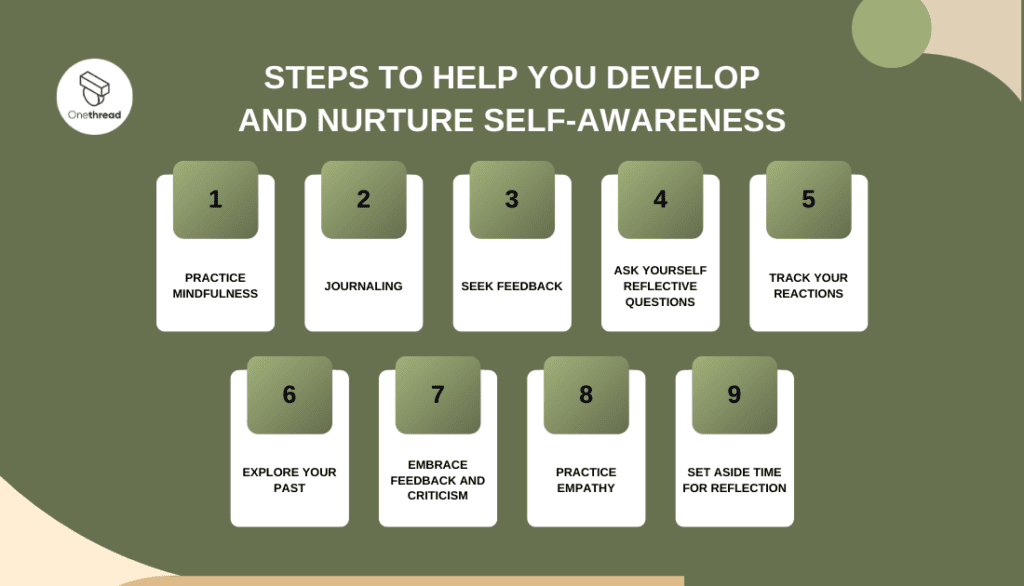



Cultivating self-awareness is a transformative journey that involves self-reflection, observation, and a willingness to learn about oneself. Below are some practical steps to help you develop and nurture self-awareness:
Practice Mindfulness
When you’re mindfull, you remain present in the moment and observe your thoughts and emotions without being judgemental. Engaging in mindfulness meditation or mindful activities can help you develop a deeper awareness of your inner experiences.
Journaling
Keep a journal to record your thoughts, feelings, and experiences regularly. Writing about your daily experiences and emotions can reveal patterns, triggers, and areas that require self-exploration.
Seek Feedback
Encourage honest feedback from close friends, colleagues or family members. Constructive feedback can provide you with the necessary info about your personality traits and help you see yourself from others’ perspectives.
Ask Yourself Reflective Questions
Regularly ask yourself questions about your motivations, values, and emotions. For example, “What are my strengths?” “What situations make me feel stressed?” “Why do I react this way?” Honest self-inquiry can lead to meaningful self-discovery.
Track Your Reactions
Be mindful of your emotional reactions in various situations. Notice patterns in your reactions and explore the underlying reasons for these responses.
Explore Your Past
Reflect on significant life events, work performance, and experiences that have shaped you. Gaining insight into your beliefs and behavioral patterns can be enriched through an understanding of your past experiences.
Embrace Feedback and Criticism
Be open to feedback, even if it’s challenging to hear. Use criticism constructively to learn more about yourself and identify areas for growth.
Practice Empathy
Cultivate empathy towards others to better understand their perspectives and emotions. Empathy can foster a deeper connection with others and enhance your ability to understand your impact on them.
Set Aside Time for Reflection
Carve out regular periods for self-reflection, whether it’s daily, weekly, or monthly. Use this time to assess your progress, identify areas for improvement, and celebrate your achievements.
Remember, cultivating self-awareness is an ongoing process that requires patience and self-compassion. Embrace the journey, be gentle with yourself, and celebrate each step of self-discovery.
With dedication and openness, you’ll uncover the layers of your inner self, paving the way for personal growth, improved decision-making, and a more fulfilling life.
Bottom Line
As you wrap up this eye-opening adventure through the realms of self-awareness and productivity, remember that you hold the key to unlocking your true potential.
Embrace those moments of self-reflection and growth, for they are the stepping stones to a more balanced and efficient life. By staying attuned to your thoughts, emotions, and actions, you’ll find yourself making wiser decisions and harnessing your strengths like a pro.
As you journey onward, don’t forget to be patient with yourself. Rome wasn’t built in a day, and self-awareness is a continuous process. Allow yourself room to learn, adapt, and evolve. Celebrate your wins, both big and small, and treat setbacks as valuable lessons.
So, dear reader, go forth with newfound self-awareness as your guiding light. Productivity isn’t just about getting more done; it’s about living a purposeful and joyful life.
Armed with self-awareness, you can craft a path that aligns with your passions and values, making each day a step closer to the extraordinary life you envision. Keep growing, keep learning, and keep being the wonderful, productive soul that you are. The world eagerly awaits the brilliance that lies within you!
